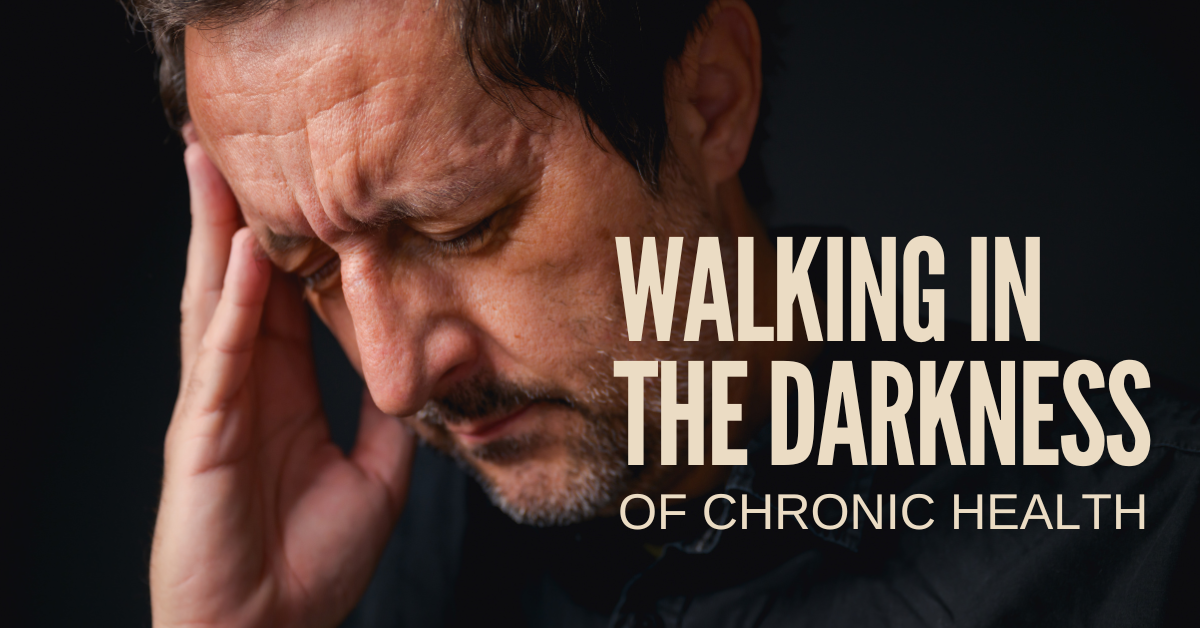Walking in the Darkness of Chronic Health
Caring for a patient requires caring for the whole person, a whole person who is a collection of parts. Some of these parts are more easily cared for by medicine than others. Some of these parts are better cared for by families, churches, and communities than by a health care system. This second class includes particularly those with the invisible symptoms of chronic illness who feel like they live life in the dark shadows where others do not see their symptoms and therefore cannot understand, much less appreciate, their suffering.
Walking in the shadows means different things for each of these chronic health sufferers. For some, their chronic fatigue, while not seen by those looking at them, limits what they can do in a day. At times, it means they can only do some of the many chores life gives them before needing to rest or even nap. At times, it means even the simplest self-care is a struggle, maybe even temporarily impossible, since they can’t get up from bed. At times, it means they simply cannot attend a family, church, or community event where some perfume, some food, or some overstimulation could lead to more fatigue or to dizziness, nausea, weird rashes, headaches, or syncope. At times, it means they cannot enjoy the simple pleasures of life without some thorn in their flesh stealing pleasure from them.
For others, it means that food related events are dangerous threats rather than joyous gatherings. If others do not take seriously their peanut allergy or their gluten reactions, they could suffer for days or even risk life itself. They may have to look upon multiple food options and pass by as others brag on the wonders of Aunt Jane’s biscuits. Being a full blow foodie exploring random restaurants is forever off limits; they must choose from the same restaurants over and over.
For those with mold toxicity, invisible chemicals threaten their health and emotional peace. They cannot just walk through a new building door without looking around and sniffing a few times. They cannot just book a hotel without checking the hotel’s age and packing an air purifier. They cannot even look forward to holiday gatherings without having to discuss where they stay and how long they can be inside a moldy home. They are forced to have difficult conversations about why they can’t just pop over for a visit in someone’s moldy house. They may even be hindered from gathering for worship when the leaky church roof feeds mold in the sanctuary.
Then, even apart from this less-than-exhaustive list of obstacles, they too often have to face the world alone because others don’t fully grasp the storms they live through. After saying no to gatherings a few times, they stop getting invites. After feeling embarrassed by public displays of acute symptoms, friends and family start avoiding them, including avoiding invitations. After living for years through bouts of the symptoms, others often stop asking how they are doing and start wondering when the person will just get over it. They feel unheard, misunderstood, and forgotten.
For these reasons and many more, I continue to pray for Christians who have God’s Spirit at work within them to be moved to step into the dark shadows and walk with those who suffer such invisible conditions. As a physician, I can guide medical decisions and help them overcome many physical challenges, but ultimately, even with great physical improvement, so many need relationship and emotional support that I cannot give 24/7, both during treatment and when they are recovering from years of illness. I need families and churches to step into that gap and love as Christ called us all to love the weakest in our midst. I pray for that to happen in the lives of all those who suffer in the darkness.
Sanctuary Functional Medicine, under the direction of Dr Eric Potter, IFMCP MD, provides functional medicine services to Nashville, Middle Tennessee and beyond. We frequently treat patients from Kentucky, Alabama, Mississippi, Georgia, Ohio, Indiana, and more… offering the hope of healthier more abundant lives to those with chronic illness.

Dr. Eric Potter graduated from Vanderbilt Medical School and then went on to specialize in internal medicine (adult) and pediatric care, spending significant time and effort in growing his medical understanding while caring for patients from all walks of life.









